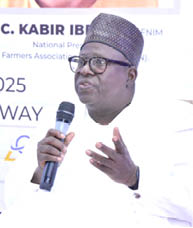We must address ‘threat factors’ in food availability – AFAN
The president of the All Farmers Association of Nigeria (AFAN), Architect Kabir Ibrahim, has called for urgent action to address critical “threat factors” affecting the nation’s food availability. Speaking on the topic “Nigeria’s food system: Challenges and opportunities in the attainment of food security” at the 22nd Daily Trust Dialogue, Ibrahim outlined the numerous obstacles […]

kabir ibrahim
The president of the All Farmers Association of Nigeria (AFAN), Architect Kabir Ibrahim, has called for urgent action to address critical “threat factors” affecting the nation’s food availability.
Speaking on the topic “Nigeria’s food system: Challenges and opportunities in the attainment of food security” at the 22nd Daily Trust Dialogue, Ibrahim outlined the numerous obstacles undermining Nigeria’s food security, including macroeconomic instability, insecurity, currency volatility, climate change, low mechanisation, and poor post-harvest management.
“Nigeria has suffered from severe insecurity in the food production areas of the North East, North Central, and North West for more than a decade,” Ibrahim said.
He added, “This, along with other challenges such as COVID-19, the Russia-Ukraine war, and other global disruptions, has weakened the global food system and, by extension, Nigeria’s food system.”
- Street foods becoming unaffordable for many Nigerians – Kabiru Yusuf
- We are tired of saying Nigeria has potentials – Minister
Highlighting the impact of climate change, Ibrahim noted that global warming caused by excessive greenhouse gas emissions, including methane and carbon dioxide, has led to extreme weather events like flooding and droughts.
“In previous years, flooding incidents in Nigeria occurred at 10-year intervals. However, over the last four years, they have become annual events,” he observed.
On inflation, Ibrahim emphasised the adverse effects of the naira’s devaluation over the past 18 months, which has exacerbated food prices and impacted farmers’ productivity.
“The weak penetration of tractors and other farm machinery, coupled with the high cost of inputs such as agrochemicals and fertilisers, has impeded productivity. These factors, along with post-harvest losses, limit food availability and affordability, worsening food insecurity,” he explained.
Ibrahim also stressed that inadequate power supply hampers food processing, cold storage, and value addition, resulting in significant post-harvest losses.
“Illegal taxation along highways further inflates food costs, contributing to food inflation and reducing affordability. These factors directly affect food security,” he added.
The AFAN president proposed several solutions, including non-kinetic approaches to addressing insecurity.
“Insecurity may require disruptive methodologies, such as defoliating forests or bulldozing them in some cases. While this may not sit well with climate change activists, it could be a necessary pill to swallow,” he suggested.
Ibrahim also called for the provision of adequate, affordable, and sustainable food distribution systems, and support for smallholder farmers with hand-held equipment and for large-scale farmers with high-capacity tractors and machinery.
He also advocated for investment in high-quality seeds, agrochemicals, and processing equipment, and the strengthening of the naira to enhance Nigeria’s competitiveness in international trade.
“Addressing these threat factors is essential to improving food security and ensuring no Nigerian goes hungry,” Ibrahim concluded.
